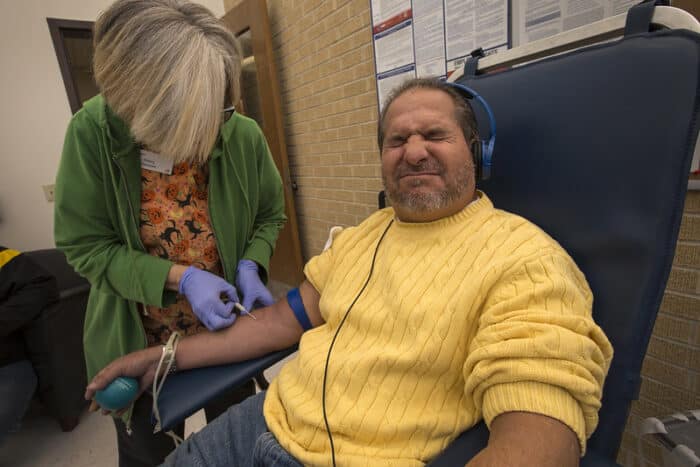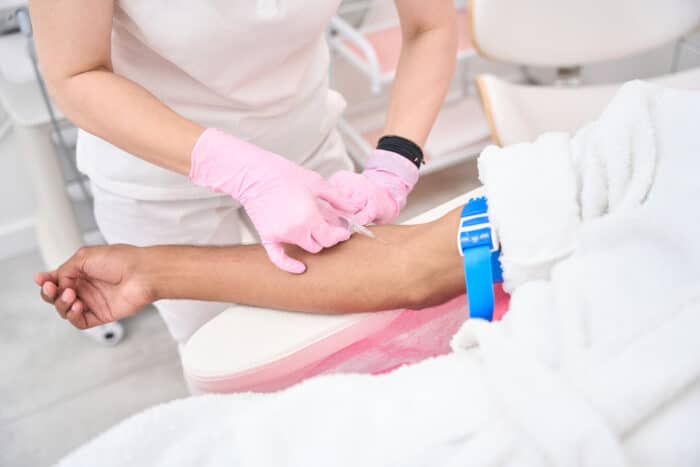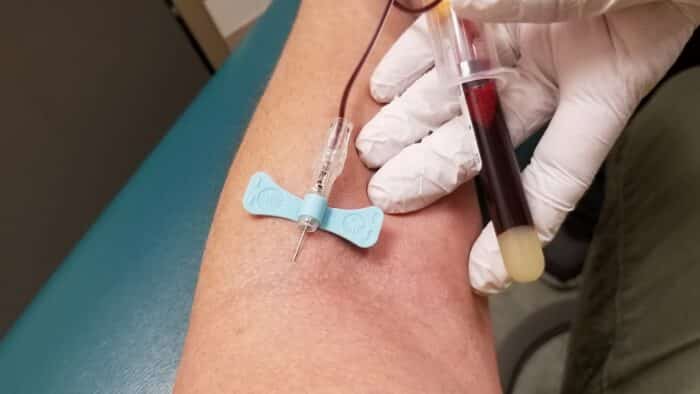Have you ever been interested in the art of drawing blood with precision? Is helping people your passion?
If you answered yes to any or both of those questions, becoming a phlebotomist might be your best career choice.
These unsung heroes are considered to be the backbone of any healthcare system, simply because their main skill, which is drawing blood, is used for the diagnosis of various illnesses.
If you’re here, you might be interested to know what you need to become a phlebotomist and a successful one at that.
In this article, we will uncover the top 3 things employers look for while hiring phlebotomists.
So, let’s dive right in!
3 Things You Need to Be a Phlebotomist
If you’re an aspiring phlebotomist, you might be wondering what are the main things you need to do to become a successful phlebotomist.
Let us help you with that.
Education-
In any profession, education is highly important as it equips you with the right knowledge and set of skills specific to your job profile.
It’s the same case for phlebotomists. Getting the right education is vital for becoming a successful phlebotomist because it will provide you with the necessary skills and knowledge to handle the roles and responsibilities safely and effectively.
Phlebotomists are allied healthcare professionals who perform blood draws on patients for tests, donations, or other reasons. Here’s why education is an important aspect for phlebotomists:
- Human Anatomy Knowledge: Phlebotomists need to know about the body, especially how the blood vessels work. Education helps you understand where to find veins and how to do the job without causing any discomfort.
- Safety and Infection Control: It’s important to learn how to protect yourself as well as the patients from germs. Getting the right education teaches you how to wear the right clothes and keep everything clean so that nobody gets sick.
- Right Techniques: Drawing blood is a skill, and education helps you learn how to do it correctly. You get to practice with guidance until you’re really good at it.
To become a phlebotomist, you usually need to complete a phlebotomist training program where you get to learn all these things. This could be a short course or a bit longer.
The two main ways you can complete your phlebotomist training is to either get a diploma from a community college or enroll in an online training program, which is often recommended.
Also see: How to Become a Phlebotomist
Certification-
Another important thing you need to become a phlebotomist is certification.
Even though getting certified might not be necessary in some states. Employers highly prefer candidates who are certified over uncertified ones.
When phlebotomists draw blood from patients, they need to perform the blood draw the right way to keep patients safe and avoid any mistakes. Being certified means they’ve been trained properly and follow the right steps.
Having certification also helps phlebotomists find employment. It can also lead to better opportunities and more money in the long run. Plus, being certified means they’re always learning and improving, which is really important in healthcare.
There are many recognized authorizations that offer certifications for phlebotomists, such as the National Healthcareer Association (NHA) which offers the Certified Phlebotomy Technician (CPT) exam, and the American Society for Clinical Pathology (ASCP) which offers the Phlebotomy Technician (PBT) exam.
Also read: Phlebotomy Certification
Experience-
Hands-on experience is also extremely important for phlebotomists since their main responsibility is drawing blood for medical tests and donations.
This kind of experience helps them learn and refine the skills they need. They become skilled at accurately finding veins, positioning needles correctly, and handling the flow of blood.
Practical experience also teaches phlebotomists how to work well with patients. They learn how to keep patients calm and comfortable during blood draws.
Additionally, hands-on experience is essential for dealing with unexpected situations, like difficult veins or complications during the procedure. It helps phlebotomists build confidence, use their medical knowledge effectively, and become better at problem-solving.
There are a few online phlebotomy training programs that provide the opportunity for externships once you finish their course, which can be highly beneficial for aspiring phlebotomists.
Frequently Asked Questions (FAQs)
What Degree Do You Need to Be a Phlebotomist?
To become a phlebotomist, you generally don’t need a formal degree from a traditional university. Instead, most phlebotomists complete a certification program, which can be obtained through community colleges, vocational schools, or online courses.
These programs generally take a few months to a year to complete and provide comprehensive training in phlebotomy techniques, safety protocols, anatomy, and medical ethics.
Some employers may also require a high school diploma or equivalent as a basic educational requirement. While a certification isn’t necessary, obtaining a certification demonstrates your proficiency in the field and increases your employability as a skilled phlebotomist.
What Education Do You Need to Be a Phlebotomist?
The minimum prerequisite for becoming a phlebotomist is a high school diploma or a GED. Many phlebotomists complete a post-secondary education program, which can range from a certificate program that lasts a few months to a longer diploma program offered by community colleges, vocational schools, or technical institutes.
These programs provide comprehensive training in blood collection techniques, safety protocols, anatomy, medical terminology, and patient interaction.
Some states in the US may require phlebotomists to be certified, which involves passing an exam after completing an accredited program. Hands-on clinical experience is a crucial component of these programs, allowing aspiring phlebotomists to practice blood draws under supervision.

Do You Want To Become a Phlebotomist? Check Out Free Phlebotomist Masterclass!
In our masterclass you learn:
- How to be a Phlebotomist faster…in just 2 months!
- Avoid student debt & driving to classes
- #1 thing employers want from Phlebotomists
- How to stand-apart & get a university certificate for a strong resume
What Skills Do You Need to Be a Phlebotomist?
A successful phlebotomist needs several key skills that are essential for their job profile, such as:
- Excellent communication skills to interact with patients and ease their concerns during the blood collection process.
- Manual dexterity is crucial for accurately locating veins, positioning needles, and performing blood draw with precision.
- Attention to detail ensures that samples are correctly labeled, recorded, and handled to maintain the integrity of diagnostic tests.
- A strong understanding of infection control procedures and sterile techniques is vital to prevent cross-contamination and ensure patient safety.
- Adaptability is essential for dealing with varying patient needs and unexpected situations.
- Empathy and a patient-centric approach to provide a comfortable and positive experience for individuals of diverse backgrounds.
- Teamwork, maintaining professionalism, and upholding ethical standards are crucial aspects of a phlebotomist’s role.
Also read: Day in the Life of a Phlebotomist
What Certification Do You Need to Be a Phlebotomist?
To become a certified phlebotomist, you would typically need to complete a phlebotomy training program from an accredited institution. These programs usually cover topics such as anatomy, physiology, blood collection techniques, safety protocols, and patient interactions.
After completing the training, aspiring phlebotomists can then apply for certification through organizations like the American Society for Clinical Pathology (ASCP), or the National Healthcareer Association (NHA).
Each organization has its own certification exam, and passing this exam demonstrates the individual’s competence in phlebotomy skills and knowledge. Certification is not always legally required, but it is highly recommended as it enhances job prospects, validates expertise, and ensures adherence to professional standards in the field of phlebotomy.
Conclusion
In conclusion, becoming a phlebotomist is an achievable goal for anyone with the right dedication and training. While the journey may require some formal education and certification, the rewards are worth it.
As a phlebotomist, you’ll play a crucial role in healthcare, ensuring that patients receive the care they need while feeling comfortable and respected during the blood-drawing process. So, if you’re considering a career in phlebotomy, remember that with the right attitude and education, you can make a positive impact on the lives of many and find a fulfilling and meaningful career in the medical field.
Related Resources:
- Phlebotomist Salary
- Phlebotomist Skills
- Phlebotomist Job Description
- Phlebotomist Duties
- What is the Difference Between a Licensed Phlebotomist and Certified Phlebotomist?
- Where Can a Phlebotomist Work?
- Pros and Cons of Being a Phlebotomist
- Phlebotomy Externship
- Mobile Phlebotomist
- What are the Different Types of Phlebotomy Certifications?
- Phlebotomist Cover Letter
- Therapeutic Phlebotomy
- Phlebotomy Course
- Phlebotomy Classes
- Online Phlebotomy Classes
- Order of Draw Phlebotomy
- Phlebotomy Internship
- 4-Week Phlebotomy Classes Online
Related Articles
-
How to Be Successful in College in 2022 – 7 Simple Tips to Succeed
-
How Do Scholarships Work? Read This First…Truth is Shocking
-
7 Best College Majors 2024: What Should I Major In?
-
How to Choose a College – 10 Things You Must Consider in 2024
-
Why Go to College? Top 13 Benefits for Adult Students in 2022
-
Top 5 Best Alternatives to Community College for 2024







